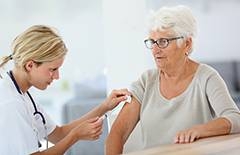Immunizations Aren’t Just for Kids.
Medically Reviewed by Chris S. McCauley, MD
“Trix is for kids!”
If you’re a woman of a certain age, you will probably remember that TV commercial in the late 20th century. You probably also remember that the multi-colored breakfast cereal wasn’t just for kids. The same can be said of immunizations: “Shots aren’t just for kids.”
“A number of immunizations are specifically for mature adults,” says McLeod Gynecologist Chris McCauley, MD. “It’s also important to talk to your doctor if you didn’t receive immunizations against certain diseases as a child.”
AGE-RELATED IMMUNIZATIONS
- Flu Shot. Nearly a quarter of a million people are hospitalized every year due to the flu and 60% of those hospitalized are over age 65. An annual flu shot can help not only avoid hospitalization, but also sore throat, runny nose and lung irritation, as well as the chills, fever, and fatigue.
- Pneumococcal Vaccine will help you avoid pneumonia in your lungs or serious meningitis in your brain and spinal cord. Every woman over age 65 should have two doses of slightly different vaccines. One type is PCV13 (conjugate), and the other is PPSV23 (polysaccharide). If that’s all too technical, simply talk with your physician about what you should do.
- Shingles is caused by the same virus that triggers chicken pox. Of the estimated one million people who suffer from shingles each year, half are 60 years of age or older. Shingles starts with an extremely painful rash that then blisters. The rash can clear up in a few weeks, but pain and some vision damage can linger for a longer time.
EVERY 10 YEARS
- Tetanus is caused when wounds are contaminated with dirt, spit or a dirty nail or needle. The result is a tightening of the body’s muscle and “lockjaw.” Adults who did not have a tetanus shot as a child should ask their doctor about a “Tdap” shot. Then, every 10 years adults need a tetanus (Td) booster.
IF YOU DIDN’T HAVE THEM AS A CHILD…
Vaccinations for chicken pox, measles, rubella, mumps, and whooping cough (pertussis) are usually offered to young children.
A woman, who has not been immunized for these diseases, should talk with her Gynecologist.
ACTION TO TAKE
For more information on vaccines and immunizations for adults, click here.
Sources include: McLeod Health, US Centers for Disease Control & Prevention, Agency for Healthcare Research & Quality, National Institutes of Health
-
McLEOD REGIONAL MEDICAL CENTER FLORENCE
843-777-2000 -
McLEOD DARLINGTON
843-777-1100 -
McLEOD DILLON
843-774-4111 -
McLEOD LORIS
843-716-7000 -
McLEOD SEACOAST
843-390-8100 -
McLEOD CHERAW
843-537-7881 -
McLEOD CLARENDON
803-433-3000



-
McLEOD REGIONAL MEDICAL CENTER FLORENCE
843-777-2000 -
McLEOD DARLINGTON
843-777-1100 -
McLEOD DILLON
843-774-4111 -
McLEOD LORIS
843-716-7000 -
McLEOD SEACOAST
843-390-8100 -
McLEOD CHERAW
843-537-7881 -
McLEOD CLARENDON
803-433-3000
 Find a Doctor
Find a Doctor  Locations
Locations  Services
Services 